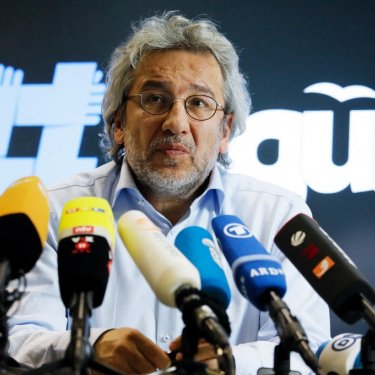Turkey’s never-ending judicial persecution of former newspaper editor

Reporters Without Borders (RSF) condemns Turkey’s political and judicial persecution of former newspaper editor Can Dündar, who was already sentenced in absentia last December to 27 years in prison for “spying” and “assisting a terrorist organisation” and who is now facing possible life imprisonment in a trial that resumed today in Istanbul. This persecution discredits Turkey’s human rights reforms, RSF said.
The former editor of the Cumhuriyet newspaper, Can Dündar is being tried – in absentia again – on charges of espionage and “trying to overthrow the constitutional order” in connection with his role in major anti-government protests in Istanbul’s Gezi Park in the spring of 2013. He and the six human rights activists who are his co-defendants face the possibility of sentences that together would total 2,970 years in prison.
At the end of today’s half-hour hearing, the court decided to combine their case with the trial of nine other leading civil society figures including the philanthropist Osman Kavala. The next hearing was set for 21 May.
Parallel proceedings have been initiated for the arrests of Dündar and his six co-defendants – the actor Mehmet Ali Alabora, the actress Pinar Ögün and the activists Gökçe Yılmaz, Handan Meltem Arıkan, Hanzade Hikmet Germiyanoğlu and İnanç Ekmekçi – who are all now living in self-imposed exile. They are also unjustly accused of attacking a mosque and acts of looting.
“Nothing can better illustrate this government’s arbitrary attitude towards its critics than the political and judicial persecution of the journalist Can Dündar,” RSF Turkey representative Erol Önderoglu said. “This trial is contrary to the spirit of its vaunted human rights reforms. Turkey cannot aspire to improve its relations with the European Union if it so openly flouts the law and justice with this kind of prosecution of a journalist who just did his job.”
Political and judicial persecution
The 27-year jail sentence the Dündar received last December was punishment for a story headlined “İşte Erdoğan’ın yok dediği silahlar” (These are the weapons Erdogan denies exist) that he published in Cumhuriyet when he was still its editor in 2015.
It was accompanied by photos and videos that showed that Turkish intelligence was helping to supply weapons to Islamist groups in Turkey. President Recep Tayyip Erdogan responded by threatening him on the air on the state TV channel TRT: “The person who wrote that exclusive article will pay dearly. I won’t let him get away with it.”
Dündar’s judicial problems date back to November 2015, when he was arrested and held for three months until released on the basis of a ruling by the Constitutional Court, which said his detention was unconstitutional.
After a court appearance in the Istanbul district of Caglayan on 6 May 2016, Dündar narrowly escaped an armed attack as he left the court building to give interviews to the journalists outside. It was this attack that led him to move to Germany, where he launched a news website called Özgürüz (We are free).
ECHR condemns arbitrary imprisonment
On 13 April, the European Court of Human Rights (ECHR) ruled that the constant threat of imprisonment hanging over journalists in Turkey violates the rights to security and freedom of expression, and it ordered the government to pay €15,000 in compensation to Ahmet Altan, a journalist sentenced to 10 years and six months in prison for alleged supporting the group said to have masterminded a coup attempt in July 2016.
Altan was released the next day, 14 April, as a result of a decision by Turkey’s highest appeal court that his sentence was disproportionate. The ECHR also ordered the government to pay nearly €15,000 in compensation to Murat Aksoy, a journalist who was imprisoned for 16 months after the 2016 coup attempt.
Turkey is ranked 153rd out of 180 countries in RSF's 2021 World Press Freedom Index.



